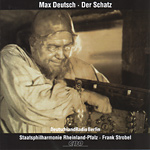Max Deutsch’s music for the 1923 silent film Der Schatz reportedly was the first film score to be presented as a legitimate work for the concert hall. Subtitled “A Film Symphony”, Der Schatz is arranged into five acts, each more or less a self contained movement. The movie relates the tale of two old Slovenian peasants who become obsessed with finding a hidden treasure, trading their daughter Beate to their young apprentice, Svetelenz, for his share of the booty. However, Beate loves the handsome and true Arno, whom the parents have sent on a false errand so they could steal the treasure for themselves. When Arno and Beate run off, the rejected Svetelenz utters a curse that reigns down destruction on all three treasure hunters.
For this scenario Deutsch (a pupil of Schoenberg) fashioned a lively and brilliantly inventive work (prominently featuring the piano) that quotes liberally from a number of other composers, primarily Richard Strauss–Till Eulenspiegel, Don Juan, Don Quixote, and Sinfonia Domestica all make brief appearances. Deutsch’s style blends seamlessly with that of Strauss, lending the work an almost continually upbeat mood. However, when events darken Deutsch turns to Schoenberg, more than once borrowing Pelleas und Melisande’s tragic passages for dramatic impact. The closing bars of Verdi’s Otello provide the love music, while Deutsch even quotes the main scherzo theme from Mahler’s Fifth Symphony.
Of course today’s listeners, having easy access to recordings, are much more likely to notice the references than did the film’s contemporary audience. But the piece is no less enjoyable for this–in fact, guessing what came from where makes it a bit of fun. Frank Strobel and the Rheinland-Pfalz State Philharmonic also seem to be having fun as they offer committed, virtuosic, and highly polished performances. The recording’s acoustic is somewhat over-resonant, but it nevertheless provides satisfying presence and impact. A pleasing and unusual release, well worth your consideration.
































